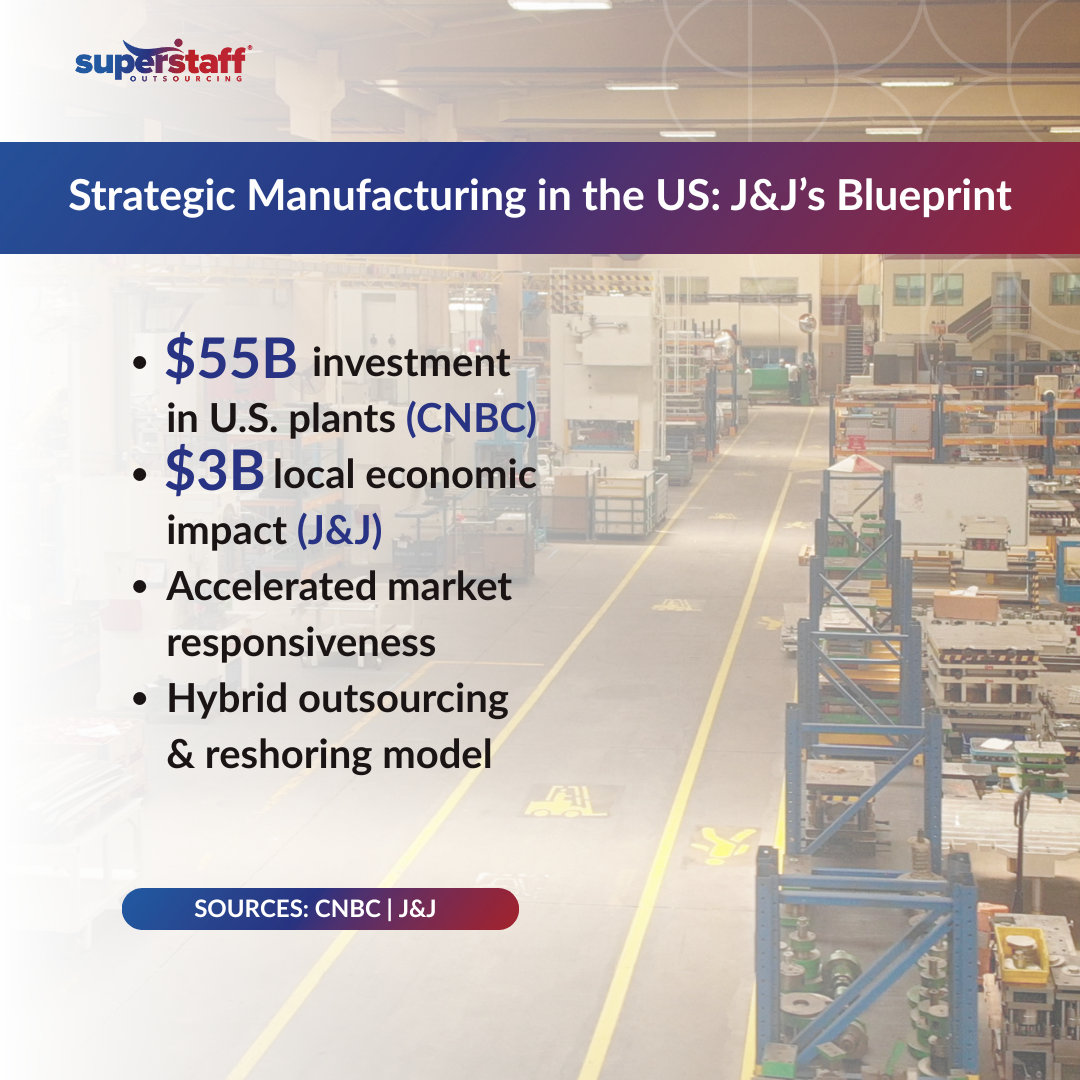
In today’s interconnected economy, tariff pressures and geopolitical tensions have pushed many global businesses into rethinking their traditional operational strategies.
One standout example is Johnson & Johnson, a pharmaceutical giant recognized worldwide. According to CNBC, J&J plans to invest over $55 billion to build four new manufacturing plants in the U.S., underscoring their strong commitment to strategic manufacturing in the U.S. and setting a robust precedent for how companies can effectively respond to current economic and political volatility.
This strategic decision is reshaping their approach and setting a benchmark for many other enterprises seeking stability and sustainable growth.
Let’s explore J&J’s strategy, and how outsourcing plays a vital role in complementing such domestic expansion moves.
Tariff Uncertainty: A Wake-Up Call for Global Enterprises

Recent years have brought a wave of tariff hikes and new trade policies that left many companies scrambling. Importing essential components from regions like Asia, previously an economically sound choice, suddenly became fraught with uncertainty. This instability didn’t just raise costs—it triggered a domino effect, squeezing profit margins and exposing significant vulnerabilities in global supply chains.
The pharmaceutical industry, particularly vulnerable to these disruptions, has experienced the impact of tariffs on pharma companies firsthand. Active pharmaceutical ingredients (APIs) and specialized components imported from overseas have seen dramatic price increases. These inflated costs are challenging companies’ profitability and raising concerns about supply chain reliability.
As companies navigate these choppy waters, they have realized one thing clearly: dependence on global supply chains carries substantial risk. Businesses reliant on international sourcing find themselves vulnerable to sudden policy shifts and geopolitical disputes, potentially devastating their operations overnight. The solution, many have discovered, lies in strategically rebalancing their manufacturing and distribution networks.
J&J Reshoring Operations: A Bold Domestic Expansion
Johnson & Johnson, long a leader in innovation and strategic foresight, swiftly recognized these shifting dynamics. Understanding the impact of tariffs on pharma companies, J&J reshoring operations became an essential part of their long-term strategy. They committed to a comprehensive expansion of domestic manufacturing, aiming not just to mitigate risk, but to position themselves strategically within the evolving U.S. economic landscape.
Through substantial investments in new facilities across various states, J&J underscored their commitment to creating jobs, boosting local economies, and improving operational efficiency. According to Johnson & Johnson themselves, these new initiatives are expected to generate around $3 billion in economic impact for local communities within the first decade of operations.
These efforts demonstrate a clear intent: reduce international dependencies, enhance control over their supply chains, and streamline regulatory compliance processes—all crucial elements for the pharmaceutical industry.
By reshoring essential parts of their supply chain, J&J achieves greater agility and responsiveness. Strategic manufacturing in the U.S. allows quicker adjustments to production based on market demands and reduces time-to-market significantly. Moreover, domestic operations improve overall quality assurance through closer oversight and stricter adherence to regulatory standards, vital for building trust among customers.
Why Outsourcing Complements Reshoring Strategies
However, expanding domestic manufacturing doesn’t imply bringing every aspect of business operations back to home soil. Instead, companies like J&J recognize the wisdom in maintaining a balanced approach. Core operations—those critical to brand value, product integrity, and competitive advantage—are being reshored, while non-core functions continue to benefit significantly from outsourcing.
Outsourcing serves as a strategic lever, balancing the control of domestic operations with the flexibility and cost-efficiency provided by global teams. Offshore and nearshore solutions help manage tasks outside the core manufacturing and innovation functions, freeing domestic resources to concentrate fully on core competencies. Companies can thus strike a delicate balance between control and flexibility, leveraging global efficiency without sacrificing domestic strength.
Ideal Functions for Outsourcing in the Pharmaceutical Sector
There are numerous tasks ideally suited for outsourcing in the pharmaceutical industry, particularly those not requiring direct physical oversight. Functions such as customer support, administrative processes, regulatory compliance documentation, and supply chain data management are well-suited to outsourced teams.
Handling customer inquiries, processing orders, managing accounts receivable/payable, and coordinating supply chain logistics—these areas require specialized skill sets and flexibility but do not necessitate an on-site presence.
For Johnson & Johnson, and similar businesses, outsourcing these functions means domestic talent can remain focused on product innovation, quality control, and high-value operations. By shifting routine, high-volume activities to capable outsourcing partners, companies ensure operational efficiency without overextending their local workforce.
Cost Efficiency and Flexibility through Outsourcing
Outsourcing also significantly alleviates the financial pressures that come with expanding domestic operations. Companies expanding strategic manufacturing in the U.S. face considerable upfront investments, ongoing operational costs, and overhead expenses. Outsourcing provides flexibility to scale services rapidly, manage fluctuating workloads, and reduce the need for large-scale internal teams, thereby optimizing overall operational expenditure.
The ability to quickly scale support functions up or down without significant capital investment is invaluable in today’s fast-paced market. Outsourced teams can rapidly adapt to shifts in workload, providing a highly agile and responsive operational framework. This flexibility helps organizations remain financially stable while navigating the complexities of reshoring and tariff-related pressures.
Selecting the Right Outsourcing Partner
A crucial consideration when outsourcing non-core functions is the choice of provider. Pharmaceutical businesses require partners who understand industry-specific nuances, from regulatory compliance to strict quality assurance standards. An ideal outsourcing partner should offer tailored training, robust data security measures, and culturally aligned teams with strong work ethics.
Outsourcing partners that provide customizable workflows and clear service level agreements (SLAs) ensure seamless integration into existing operations. These factors are critical for achieving operational synergy between onshore and offshore teams, enabling businesses like Johnson & Johnson to manage complex global operations effectively.
The combination of strategic manufacturing in the U.S. and global outsourcing represents a hybrid model designed for modern business agility. Companies that thoughtfully choose their outsourcing partners find this hybrid structure not just practical but transformative in managing risks and enhancing business continuity.
Strategic Manufacturing in the U.S.: Johnson & Johnson’s Blueprint for Resilience
J&J’s expansion strategy highlights an important trend across global business landscapes: the shift towards domestic reshoring as a proactive measure against global economic uncertainties. Strategic manufacturing in the U.S. has emerged as a powerful tool to combat volatility, providing businesses with stability and increased control over their operations.
Johnson & Johnson’s strategy for navigating pharmaceutical tariffs in 2025 embodies foresight and adaptability, becoming a model for other enterprises facing similar challenges. By combining reshoring with strategic outsourcing, J&J demonstrates how companies can effectively balance domestic strength with global agility, creating robust, resilient operational frameworks.
Strategic Manufacturing in the U.S.: The Future of Sustainable Growth
In essence, Johnson & Johnson’s strategic approach to reshoring highlights a pivotal movement among global corporations. This shift signifies more than a temporary response to current geopolitical issues—it’s a deliberate strategy aimed at long-term sustainability, resilience, and controlled growth. By reshoring essential operations and maintaining flexibility through outsourcing, businesses can successfully navigate today’s economic challenges.
Johnson & Johnson’s blueprint is instructive for businesses seeking to adapt proactively. It illustrates clearly how strategic manufacturing in the U.S. is not merely a defensive tactic, but a forward-looking growth strategy. Companies following this lead can better position themselves to weather uncertainties and emerge stronger in a competitive global landscape.
Strategic Manufacturing in the U.S.: Taking Action with SuperStaff
Inspired by Johnson & Johnson’s success story? You, too, can implement a resilient strategy combining reshoring with smart outsourcing. At SuperStaff, we specialize in delivering tailored outsourcing solutions designed specifically to support businesses undergoing strategic expansions and reshoring initiatives. Our expertise in back-office processes, customer support, compliance management, and scalable solutions provides precisely the agility you need.
By partnering with SuperStaff, your company gains the flexibility and operational excellence required to succeed amidst today’s unpredictable economic climates. Let us help you emulate J&J’s strategy and turn tariff pressures into opportunities for growth.
Connect with SuperStaff today and begin your journey toward strategic and sustainable operational success.






